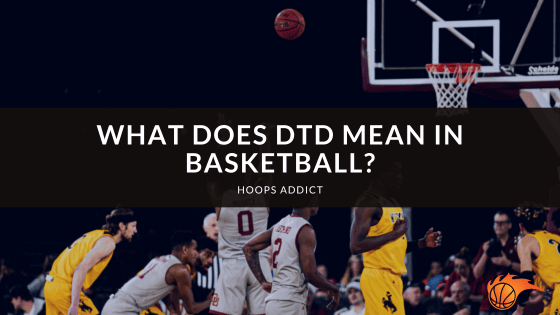Basketball gear seems to come and go all the time. Fans have seen the return of sweatbands’ popularity recently but also the demise of ninja headbands and tights. But one accessory that’s always in style is the knee bands and compression sleeves. Why do basketball players wear rubber bands on their knees? Is it merely a fashion statement, or does it serve a better purpose?
 Why Basketball Players Wear Rubber Bands on Their Knees?
Why Basketball Players Wear Rubber Bands on Their Knees?
Basketball players wear knee rubber bands and compression sleeves primarily to prevent injuries. Not only do these accessories provide stability to the knee area, but they also reduce inflammation by increasing blood flow to the knee joint. The tight, snug fit of the bands encourages blood flow, effectively reducing postgame swelling.
As you may know, basketball requires movements that put too much stress on the knees. A simple hesitation or crossover can buckle up the knees and mess up the joints, tissues, and ligaments surrounding the joint. Therefore, wearing rubber bands and compression sleeves around the knee area supports the surrounding tissues and muscles.
In addition to preventing common knee injuries (ligament and tendon tears) and decreasing swelling, outdoor basketball players may protect their knees from scratches if they fall to the ground.
Wearing knee bands or any specific equipment in basketball is generally not mandatory unless you and your friends make up some crazy rule. Basketball rules, such as those established by organizations such as FIBA and the NBA, primarily address issues such as player uniforms, safety equipment, and game protocols.
It’s also worth noting that knee rubber bands for basketball take a little getting used to. You may want to break them in during practice or training sessions so you already have a feel for them in the game.
 Benefits of Wearing Rubber Bands to Basketball Players?
Benefits of Wearing Rubber Bands to Basketball Players?
Why do basketball players wear rubber bands? Well, they won’t be doing that practice if these accessories do not benefit them personally. Besides the main reasons noted in the above section (injury prevention and increased blood circulation), here are more benefits of wearing basketball rubber bands:
- Muscle Flexibility. Since wearing sleeves and rubber bands around the knees keeps the joint and the surrounding tissues warm, it helps maintain muscle flexibility. Warm muscles are more dynamic and less susceptible to injury than cold ones.
- Fashion Statement. Rubber bands are worn by some players for fashion or personalization. These players are not looking for physical benefits, but it may help their confidence and mental focus.
- Decreases Muscle Fatigue. Compression gear, including knee rubber bands, may help reduce muscle oscillation (back-and-forth movement) during high-intensity activities, such as running and jumping. Reducing muscle vibration can decrease muscle fatigue so you can perform optimally for longer stretches.
 Does Wearing Rubber Bands on the Knees Help Knee Pain?
Does Wearing Rubber Bands on the Knees Help Knee Pain?
The benefits of knee rubber bands and compression sleeves are sometimes different for each person. However, studies have been conducted about the effectiveness of infrapatellar straps or bands around the knee. Infrapatellar bands are a form of patellar orthotics designed for athletes, especially those engaged in activities like running and jumping, the two primary movements involved in basketball.
If you’re an athlete, say a basketball player, repetitive patellar tendon/quadriceps muscle contraction can cause localized trauma at the patellar tendon below the knee. This is called a jumper’s knee. Now, the knee rubber bands or straps apply pressure on the patellar tendon to relieve strain or tension at the location of the pain.
A study by Michael Lavagnino published in the journal In Sports Health in May/June 2011, assessed twenty healthy young men with no known knee problems. With either type of strap, most participants experienced a considerable reduction in patellar tendon strain.
On the other hand, several participants were not responsive to the strap. The authors speculated that this could be due to variances in strap tightness, location, or tissue compliance. Of course, this study does not involve athletes with already problematic and symptomatic knees, which indicates the need for further examination.
Without the knowledge of this study, the mechanics behind how wearing basketball rubber bands could help players is simple enough. Putting stress on the knees, as when jumping or running, stresses the tissues and eventually causes injuries. Stabilizing the muscles takes some pressure off these tissues, thus reducing injury risk.
 When to Wear Knee Rubber Bands for Basketball?
When to Wear Knee Rubber Bands for Basketball?
Remember that wearing knee bands is a personal choice; not all players wear knee rubber bands or compression sleeves. For instance, Utah Jazz legend Karl Malone firmly believes in the futility of wearing protective gear, knee pads included.
That said, basketball players can opt to put on knee bands or sleeves for various reasons, which may be influenced by personal preferences and needs. Here are several instances in which basketball players may want to wear knee bands:
- If one has a history of knee problems. Joint and ligament injuries may heal, but these parts may be susceptible to more injuries in the future. Thus, someone with a history of such injuries may wear knee bands as a preventive measure. The bands’ compression may give the affected knee a sense of comfort and stability.
- If one is already nursing a knee injury. The same concept applies here. Knee bands may be used by players recovering from knee injuries to provide extra stability during their rehabilitation. Compression can aid in the management of swelling and the promotion of healing.
- If a basketball player is athletic and plays above the rim. Sure, all basketball players run and jump, but others are naturally better at these because of their physical attributes. You may wear knee rubber bands for extra support if you’re a gifted jumper or a cat-quick runner.
There could be more instances where basketball players choose to wear rubber bands on their knees. Whatever the case, it’s always advisable to be on the safe side and consult a doctor or sports therapist if you need to wear knee rubber bands or compression sleeves.
 How to Choose the Right Knee Rubber Bands
How to Choose the Right Knee Rubber Bands
Basketball players have several choices regarding knee rubber bands.
For instance, they could wear a patellar tendon strap to avoid patellar subluxation when the kneecap slides out of place. A compression sleeve keeps the muscles warm and increases the blood flow to the knee. Something with a hex pad may cushion the knee during knee-to-knee contact. Lastly, a hinged brace may be needed for someone who has already suffered an injury since it provides the best protection.
Now, which accessory is the right one for your knees? Here are some factors you may need when making that decision:
- If you have already experienced significant knee injuries, go for a brace or a tight compression sleeve.
- Comfort and fit are very critical. You will wear these bands for long periods of time, so if it’s not comfortable, it will affect your performance at some point.
- Knee sleeves and bands are not created equal. They may be made from neoprene and other synthetic fabrics and differ in design. Consider the material’s breathability, durability, and how it feels against your skin. Neoprene, for instance, is not breathable but is an option for someone who wants more warmth and insulation.
- Consider other design factors such as open or closed patella, silicone grips, or bands to prevent slippage, and the rubber bands’ general structure. All of these may have a significant impact on performance and comfortability.
Wrapping Things Up: Why Do Basketball Players Wear Rubber Bands On Their Knees?
Basketball is a very gear-centric sport and for a good reason. If you don’t wear the right gear and accessories, you may not be able to perform to the best of your ability. Worse, you may get injured, permanently preventing you from playing the game you love ever again.
That’s the straight answer to the question. “Why do basketball players wear rubber bands on their knees?” Knee injuries are prevalent in the sport, and one way to prevent them is by wearing a compression gear or rubber band in the area. Aside from preventing injuries, basketball rubber bands increase stability, keep the muscles warm, and increase blood flow. Healthy muscles and joints will undoubtedly lead to better overall performance.
We hope you enjoyed this post! If you did, be sure to check out our other basketball FAQ articles here.
> Why Do Basketball Players Wear Long Socks?
> Why Do Basketball Players Dribble Between Their Legs?
> Why Do Basketball Players Get Hurt So Easily?

 Why Basketball Players Wear Rubber Bands on Their Knees?
Why Basketball Players Wear Rubber Bands on Their Knees? Benefits of Wearing Rubber Bands to Basketball Players?
Benefits of Wearing Rubber Bands to Basketball Players? Does Wearing Rubber Bands on the Knees Help Knee Pain?
Does Wearing Rubber Bands on the Knees Help Knee Pain? When to Wear Knee Rubber Bands for Basketball?
When to Wear Knee Rubber Bands for Basketball? How to Choose the Right Knee Rubber Bands
How to Choose the Right Knee Rubber Bands

